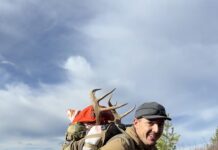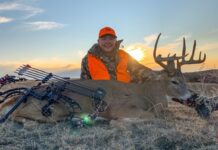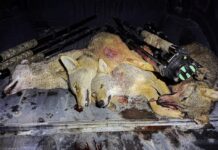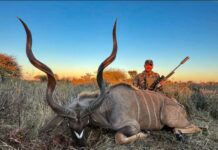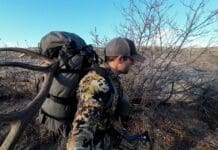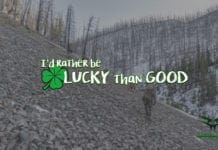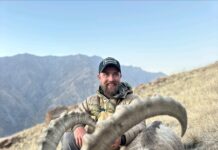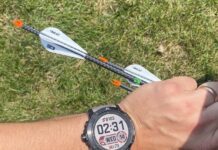Nutrition
by Les Welch
We all require food and water. Every where you look there is something, a new bar, a new energy drink, or some other new fad. We all see the “famous” diets, high protein, or no carbohydrates, or low fat. How do we decide what we need? We must choose our nutrition dependent on our needs. Ask yourself what you are trying to accomplish? Our nutrition requirements can and should change many times throughout the year depending on what phase of training, or hunting you are in. This article will cover how I fuel myself for training and for hunting. They are similar, but they differ in certain areas. There is one common denominator in hunting, training, and life in general.
The athletes and hunters who can manipulate their body Eat Clean. Eating Clean is the process of eliminating as much processed food as you can fromyour diet. These foods are high in sodium, sugar, artificial additives, artificial preservatives, and even pesticides. The more processed or refined it is the worse it will be for you. Eating Clean will help you perform better in workouts, recover faster from workouts, gain fitness faster, develop a leaner body composition, be able to handle a heavier training load, get sick less often, and suffer fewer injuries.
Training can be hard on the body. Fueling is not only a necessity, but when done correctly, it is an art. Timing is critical in making mass gains, reducing body fat, and excelling in competition. Slightly more important than timing; is selecting the right foods. High quality protein, complex carbohydrates, and good fats are essential to acquire and maintain peak performance.
Under going 3 knee surgeries in less than a year, long distance running isn’t in the cards for me anymore. To keep my cardiovascular endurance up, to maintain that competitive edge, and keep building, I now do triathlons. I find that this is very similar to mountain hunting. I am not your typical tri-guy. Most of them are light and small to maximize their speed. I try to find the balance between endurance and power. I’m constantly pushing my body to the next level, whether it is to get over the mountain into the next basin for bugling bulls, or trying to keep the guy behind me out of my draft. Pre-race I consume complex carbohydrates and protein. There is a fine line to hold though, you need to make sure the body has enough fuel to push through to the end, but yet doesn’t get too much so that it “bogs” you down. All the training in the world can’t save you from hitting the wall of not having enough fuel, or having too much sitting inside and not being able to get going. During the race or heavy exertion mountain hunting, I make sure to refuel on carbohydrates and that I am hydrating. Generally between 50-100 grams of carbohydrates an hour will be optimal under heavy race, or packing situations. I also consume a minimum of 3 liters of water per day while in the mountains. Being hydrated helps ward off altitude sickness, and keeps the headaches away. Pre and intra-workout I consume a protein drink. After working out I consume protein and clean complex carbohydrates. The Protein helps repair and build muscle tissue that has been broken down, and the complex carbohydrates replenish glycogen stores in the muscle.
For hydration in the backcountry I will use Wilderness Athlete, Cytomax, and Propel drink mixes. This helps break up the monotony of water, and more importantly it replenishes valuable Electrolytes, helps ward off cramping, andenhance exercise performance by keeping blood volume higher and core body temperature lower.
So now that we understand a little about the nutrients we need and when we need them, let’s look at my actual food.
Race mornings I will have a rice cake with peanut butter, a banana, and a scoop of chocolate protein powder mixed with water or skim milk. Then during the race or training I will have Wilderness Athlete, Cytomax, or Propel mixed with my water, and usually somewhere along the line I will have a gel. As you can see I have a balance of Carbohydrates, Proteins, and Fats. I also am staying hydrated with the drink mixes and replenishing those depleted Electrolytes. I consider a pack in to be similar to a race. I still like to have a banana before heading in. For the pack in I will have granola bars, protein bars, nuts, and gels handy. I still use the drink mixes in my water bladder to keep hydrated.
Recovery food after the race will be bananas, nuts, bars, and some sort of recovery drink. Now is the time to get in those carbohydrates and protein, refuel and repair those muscles. Once getting into my camping area and setting up camp I will usually have a bar, nuts, instant potatoes, or maybe a peanut butter bacon and honey tortilla! Yum!
The key to backcountry hunting is being able to get a lot of nutrient dense calories per ounce carried. It is a balance that you need to learn foryourself as everyone’s body reacts differently to different foods. I try to maintain 100 calories per oz of food as a guideline. I usually average around 24 oz of food per day. This includes everything for eating and drink mixes. It is more than some people take, but I know that I leave camp before daylight, and arrive back after dark EVERY day. I hunt hard all day long and require many calories.
Some of the things you will find in my pack on these hunts are listed below.
Breakfast:
Honey Nut Cheerios/Sunbelt Granola/Dark Chocolate Chips
Nutri-Grain Cereal Bars
Mountain House Granola and Blueberries
Mountain House Scrambled Eggs and Bacon
Lunch/Snacks:
Peanut Butter/Bacon/Honey Tortillas
Instant Potatoes
Jerky, Nuts
Granola Bars
Trail Mix
Mini-candy bars
Supper:
Instant Potatoes
Mountain House meals
Drinks:
Protein Drinks
Powdered Milk
Propel
Cytomax
Wilderness Athlete
Fine tune your body composition by altering you food choices in the off season while training and see the results come fall during your backcountry hunt! Eat small, Eat often, and Eat Clean!
“You cannot out train bad nutrition”




